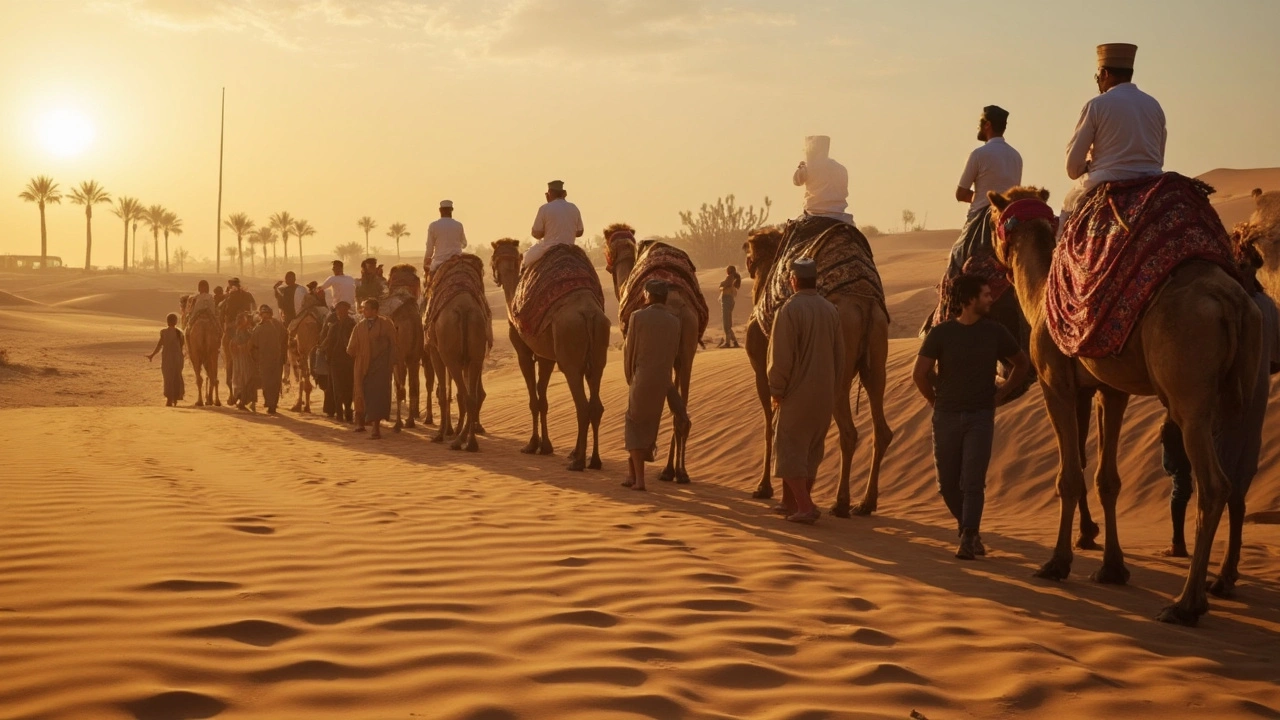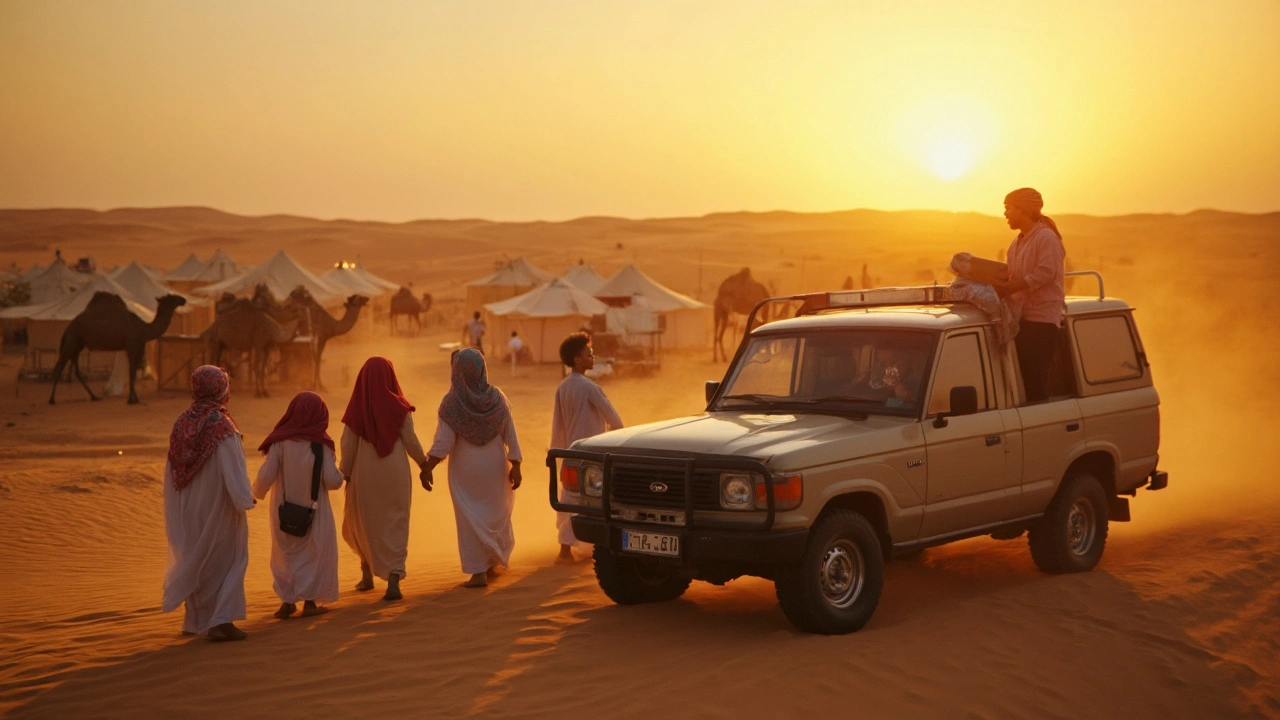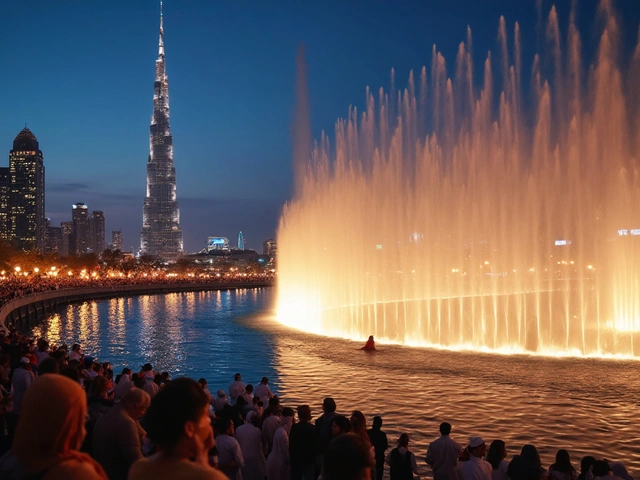If you live in Dubai or plan to visit, a desert safari isn’t just a typical tourist outing—it’s almost a Dubai rite of passage. With dramatic sunsets, rolling dunes just 45 minutes from Downtown, and adrenaline-packed dune bashing, it’s a real break from the skyscraper buzz. You get more than Instagram-worthy shots; you actually experience a slice of the UAE’s history and adventure, all in one package.
The first thing to know: Not all safaris are the same. The experience can feel totally different based on when you go, which camp you pick, and even who drives your 4x4. Some folks book with big brands like Platinum Heritage if they want more privacy, or stick with popular names like Arabian Adventures and OceanAir for bigger group fun. Read reviews, ask friends, and definitely check if food and hotel transfers are included in your package. Many camps offer halal menus and vegetarian choices, which is great if you’re worried about food options.
Local tip: Weekend evenings fill up fastest—book early, especially in cooler months like November through March. If you’re sensitive to heat, avoid midday safaris from May to September—no shade means the dunes get scorching fast. Evening safaris usually catch that legendary golden light for photos and let you chill out in proper Bedouin-style tents after the fun.
- Why Dubai’s Deserts Are Famous
- Getting the Most from Your Safari Experience
- Dune Bashing, Camels, and More: Activities to Try
- Desert Camps, Food, and Local Traditions
- Practical Tips: What to Wear, When to Go, and Trusted Operators
Why Dubai’s Deserts Are Famous
Dubai’s desert isn’t just a bunch of empty sand. You’ve got the Dubai desert safari scene bringing in thousands every week, and it’s easy to see why. Massive dunes stretch out for miles—especially in areas like Al Marmoom and Lahbab—giving thrill seekers the perfect playground for off-road action. Some of these dunes reach up to 300 feet, so it’s not just a little bump in the sand.
It’s honestly wild how close you are to all this from the city. In less than an hour, you switch from skyscrapers to almost total wilderness. Check out key spots like the Dubai Desert Conservation Reserve, which protects 225 square kilometers of land—about the size of 30,000 football fields. Here, you’ll spot native animals like Arabian oryx and gazelles. No surprise, locals and even expats see it as the go-to spot for a quick escape from daily city grind.
Besides the natural beauty, the desert comes packed with culture. That classic red-and-gold tent setup? It’s inspired by the Bedouin heritage that goes back way before Dubai’s malls and towers. Every year, Dubai also hosts events like the Al Marmoom Heritage Festival—think camel races, falcon shows, and traditional food—bringing families and tourists together for something totally different from city life.
| Desert Area | Distance from Downtown Dubai | Highlight |
|---|---|---|
| Dubai Desert Conservation Reserve | ~45 km | Wildlife, eco-friendly safaris |
| Lahbab Desert | ~50 km | Red dunes, quad biking |
| Al Marmoom Desert | ~40 km | Culture events, camel racing |
The weather also shapes the experience. Winter evenings turn the dunes into chill gathering spots, while summer days push most safaris to mornings or sunset. This is why locals watch the forecast before booking anything. For those into stargazing, the outskirts of Al Marmoom are some of the darkest spots around Dubai, so night safaris here come with an epic sky full of stars. That’s something you don’t get from your hotel balcony.
Getting the Most from Your Safari Experience
The first thing you’ll want to nail down is timing. Dubai’s summers aren’t for the faint-hearted, with temperatures soaring above 40°C. The sweet spot? Go between November and March when the weather is cool and you can actually enjoy hanging out in the sand. Most tours offer pickup between 3:00-4:00 pm, letting you dodge the worst of the heat and catch that famous sunset.
When it comes to booking your Dubai desert safari, don’t settle for the cheapest option off a random website. Look for DTCM-licensed operators, as they’re regulated and usually have safer vehicles and better-trained drivers. Platinum Heritage, Arabian Adventures, and OceanAir are the crowd favorites for a reason—they deliver what they promise. Always check what’s included, like drinks, shisha, cultural demos, and hotel pickup. Some budget tours skip camel rides or falcon shows, so read those inclusions carefully.
- Bring a power bank—phone batteries die fast out in the dunes.
- If you get car sick, pack some motion-sickness pills. Dune bashing gets rough.
- Wear closed shoes; sand sneaks in everywhere, and flip-flops don’t cut it once you’re clambering over dunes.
- Pack a light jacket if you’re going after sunset. The desert cools down rapidly once the sun dips.
For families, most operators have child-friendly seats but double-check if you’ve got younger kids. Some camps keep little ones entertained with henna, sand art, or even kid-sized camel rides, so shop around.
If you care about sustainability or conservation, some safaris like those at Platinum Heritage use vintage Land Rovers and focus on local wildlife (look out for gazelles and Arabian oryx). It’s not just about racing up the dunes—you can actually learn something, too.
| Safari Operator | Price Range (AED) | Best For | Extras Included |
|---|---|---|---|
| Platinum Heritage | 520-1450 | Luxury, Conservation | Private camp, wildlife drive, gourmet dinner |
| Arabian Adventures | 350-900 | Families, Comfort | Dune bashing, BBQ dinner, entertainment |
| OceanAir Travels | 200-500 | Budget, Social Groups | Dune bashing, camel ride, buffet |
If there’s one tip that everyone agrees on: sip water consistently. Dehydration creeps up before you realize it. Camps have bottled water but it’s smart to bring your own refillable bottle.

Dune Bashing, Camels, and More: Activities to Try
Kick off your desert adventure with Dubai desert safari dune bashing—this is the stuff everyone talks about. You'll buckle into a Toyota Land Cruiser or Nissan Patrol, and a skilled driver flies over the sand like it’s an off-road rollercoaster. Safety’s legit: only certified drivers can operate these rides, and seatbelts are non-negotiable. Kids over five can join in, but most companies won't take younger ones.
After the dune bashing rush (which usually lasts around 25-40 minutes), most tours slow down for camel rides. It’s not just about photos—camels are the original desert rides of the Emirati Bedouin. In Dubai, most safari operators have well-kept, gentle camels and short loop rides are standard, usually 5-10 minutes per guest. If you want something longer or more authentic, look for Platinum Heritage or Al Marmoom safaris. These offer proper sunset camel treks, which actually let you see how the terrain looks from a camel’s-eye view.
Want something with less bump? Try sandboarding. You get a simple board (like a snowboard), climb a dune, and glide down. Safaris bring the boards; you just need sneakers and some guts. Sandboarding's easy to learn and a hit with teens. If you want to skip the crazy angles, quad biking and fat biking are fun options, but they cost extra and have strict age rules (usually 14+ for quads).
Most desert safaris in Dubai pack in activities like:
- Hawk and falcon displays—see why falconry is the UAE’s national sport.
- Henna painting—artists decorate hands fast, and it washes out in 1-2 weeks.
- Shisha corners—most camps offer flavored tobacco in a traditional setting.
- Arabic coffee and dates—part of local hospitality, always free at the start.
Here’s how the top Dubai safari activities usually stack up (2025 numbers):
| Activity | Duration | Min. Age | Avg. Price (AED, Adult) |
|---|---|---|---|
| Dune Bashing | 25-40 min | 5 | Included in most tours |
| Camel Ride | 5-15 min | 2 | Included, longer rides extra (50-100) |
| Sandboarding | 15-30 min | 7 | Included |
| Quad Biking | 20-30 min | 14 | 100-300 |
| Falcon Show | 10-20 min | Any | Included |
It pays to check what’s included in your safari deal. If you’re booking with friends or family, group discounts are possible on weekdays. Always confirm pick-up points (some start from malls like Mall of the Emirates), and double check if you need to bring ID for quad rides.
Desert Camps, Food, and Local Traditions
Desert safari camps in Dubai come in all shapes and sizes, but the best ones keep things comfortable and make you feel part of the UAE’s heritage. Most camps are set up just outside the city, in protected reserves like the Dubai Desert Conservation Reserve or on the edges of Al Marmoom. There’s usually a big welcome area with low seating, soft carpets, and those classic lanterns you see in so many social media posts.
Food is a huge part of the experience. You’ll get everything from smoky grilled meats to creamy hummus and fresh tabbouleh. Most camps serve buffet-style dinners, so you can load up on shawarma, salads, and fresh bread straight from the oven. Outfits like Platinum Heritage focus on organic Emirati cooking, while larger operators bring in familiar crowd-pleasers. If you’ve got dietary needs, just say so ahead of time—most places are happy to help.
What sets a Dubai desert safari apart is how those camps highlight Bedouin traditions. Before dinner, you’ll spot live breads being flipped on hot stones, people spinning Arabic coffee (gahwa) over an open fire, or ladies showing off traditional henna skills. Many evenings feature live shows—a whirling tanoura dancer, drumming, or a falconer explaining how these birds help hunters in the desert. A manager from Arabian Adventures put it best:
“Bringing guests into the culture is our priority; guests love learning about our Bedouin history through food and storytelling.”
Don’t be shy about joining in. Try Arabic sweets, chat with local staff, or sip fresh mint tea under the stars. If you’re curious about anything—dress, dance, or food—just ask. You won’t offend anyone; most folks are proud to share their culture. For families, some safaris even arrange sand art stations or camel meet-and-greets to keep kids busy while adults relax.
- If it’s your first time, ask which camps have air-conditioned tents if you’re visiting in summer.
- Plan to dress modestly—think long shorts or light trousers and shirts that cover your shoulders, out of respect to local customs.
- Bring cash for tips or henna, as not all camps take cards in the middle of the dunes.

Practical Tips: What to Wear, When to Go, and Trusted Operators
Nothing spoils a Dubai desert safari faster than coming unprepared. Before you even pick an operator or glance at the dunes, a few practical basics will save your day.
What to Wear
- Loose, light clothes—cotton t-shirt, long pants, and a hat work best.
- Sunglasses and sunscreen are a must. Bring extra water if you get thirsty easily.
- Skip flip-flops. Sandals with straps or comfortable trainers make walking and activities easier.
- Evenings in winter get chilly (especially January, around 13°C at night), so toss a hoodie or lightweight jacket in your bag.
- If you’re planning camel rides or sandboarding, avoid dresses or anything flowy that could catch on equipment.
Best Time to Go
October to April is prime time. You get cooler air, softer sand underfoot, and the sunset is actually worth the early booking. If you’re fasting during Ramadan, afternoon and evening safaris can accommodate iftar meals, but always check with the operator first.
| Month | Day Temp (°C) | Night Temp (°C) | Sand Storm Risk |
|---|---|---|---|
| January | 24 | 13 | Low |
| April | 33 | 19 | Medium |
| July | 41 | 29 | High |
| October | 35 | 22 | Medium |
Trusted Operators
- Platinum Heritage: Great for eco-friendly tours and luxury vibes—think Land Rovers, not just Toyotas.
- Arabian Adventures: Reliable for classic dune bashing or bigger group trips, includes insurance and clear safety standards.
- OceanAir Travels: Gets strong reviews for sunset photography and private experiences, often includes international guides.
- Royal Vision: More budget-friendly, but keep expectations realistic, especially for group size and vehicle comfort.
Local tip—if you’re booking last minute, confirm pick-up times, vehicle capacity, and age rules for kids. Some operators don’t allow children under four years on dune bashing rides.
For families, check for kid-friendly activities on-site, like falconry, henna, or short camel rides included in your chosen package. Ask about allergy-friendly meals if food is included, since most camps can handle common dietary needs with advance notice.
Finally, always bring ID or a passport copy. Some operators will require it for insurance. And if you’re going solo, WhatsApp location sharing is smart, just in case signal drops deep in the dunes.







